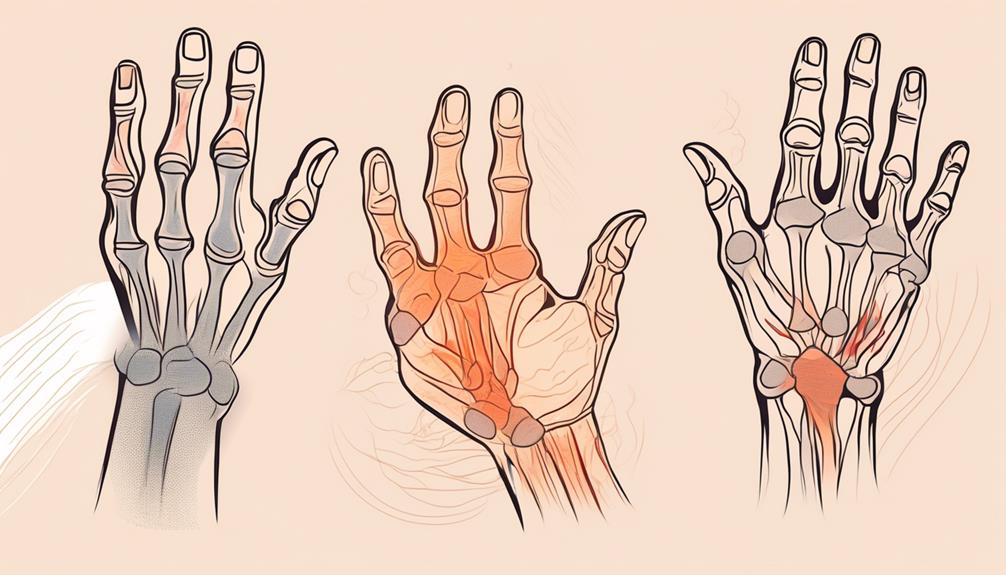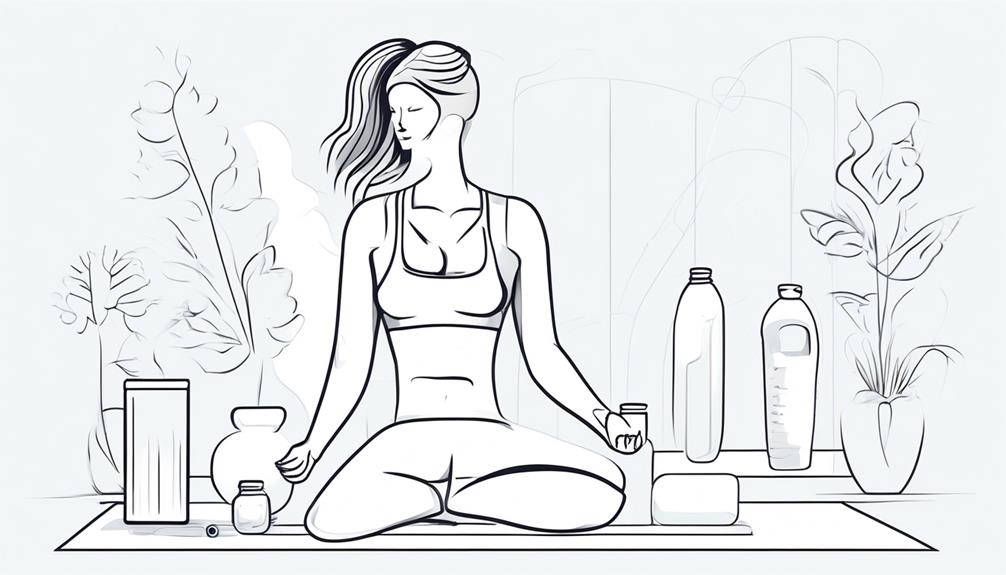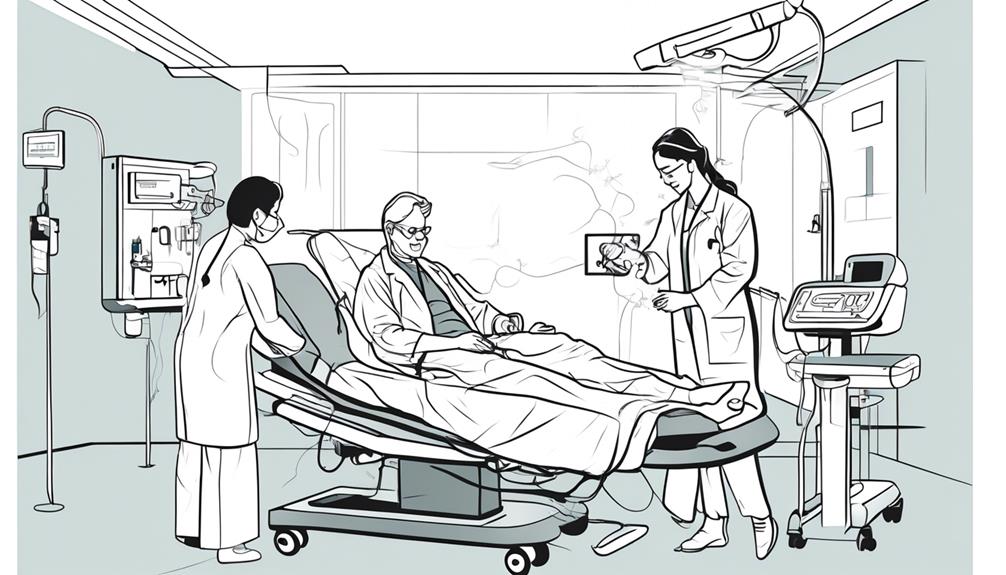6 Essential Lifestyle Adjustments for Well-Being
You may think you’re doing everything right for your well-being, but there are always adjustments that can be made to optimize your lifestyle.
These 6 essential adjustments have been proven to significantly enhance overall well-being and quality of life.
By incorporating these changes into your daily routine, you can take proactive steps towards a healthier and more fulfilling life.
So, what are these adjustments, and how can they benefit you?
Key Takeaways
- Prioritize ergonomic furniture for comfort and well-being, including adjustable chairs and desks for proper posture.
- Practice proper body mechanics and use assistive devices to protect joints from strain.
- Focus on portion control, mindful eating, and regular physical activity for weight management.
- Reduce stress through deep breathing, mindfulness practices, social connections, and adequate sleep and hydration.
Ergonomic Furniture
When outfitting your workspace, it’s essential to prioritize ergonomic furniture for the sake of your comfort and long-term well-being. Investing in ergonomic furniture offers customization options that cater to your specific needs, ensuring that your workspace is tailored to support your body’s unique requirements.
An adjustable chair and desk enable you to maintain proper posture, reducing strain on your body and promoting overall well-being. Furniture with lumbar support not only encourages a healthy sitting position but also alleviates lower back pain, allowing you to focus on your work without discomfort.
The impact of ergonomic furniture on productivity can’t be overstated. By incorporating standing desks or desk converters, you can alternate between sitting and standing, promoting better circulation and reducing the risk of prolonged sitting-related health issues.
Additionally, utilizing monitor arms to adjust the screen height and distance minimizes eye and neck strain, enhancing your ability to concentrate for extended periods. Ergonomic accessories such as footrests and wrist support further enhance comfort and minimize the risk of musculoskeletal discomfort, ensuring that you can work efficiently and effectively.
Prioritizing ergonomic furniture in your workspace is a practical and inspirational step toward serving yourself by promoting your well-being.
Joint Protection Techniques
You may find relief in incorporating proper body mechanics and using assistive devices to protect your joints from strain and injury. These techniques can help reduce stress on your joints and improve your overall well-being.
Proper Body Mechanics
To protect your joints and muscles from strain and injury, it’s essential to practice proper body mechanics, especially when lifting heavy objects or maintaining good posture. Here are some techniques to help you maintain proper body mechanics:
- Lift heavy objects close to your body to reduce strain.
- Bend at the knees when lifting to avoid straining your back.
- Keep good posture to reduce strain on your spine and joints.
Use of Assistive Devices
After mastering proper body mechanics, utilizing assistive devices becomes an integral part of preserving joint health and minimizing stress on your body. When selecting assistive devices, consider tools like jar openers, reachers, and button hooks to reduce strain on your joints during daily tasks.
It’s essential to maintain these devices regularly to ensure they function effectively. Incorporating ergonomic principles, such as using utensils and tools with larger and padded handles, can further decrease joint stress.
Additionally, practising energy conservation through planning, prioritizing activities, and taking breaks, while also using proper body mechanics, can help conserve joint health. By integrating these joint protection techniques and maintaining assistive devices, you can continue to live a fulfilling and independent life while minimizing the impact on your joints.
Weight Management
When it comes to weight management, it’s all about finding a balance that works for you.
Making small changes to your eating habits and incorporating regular physical activity can make a big difference in achieving and maintaining a healthy weight.
Healthy Eating Habits
Maintaining a healthy weight through mindful eating and nutritious food choices is essential for overall well-being and vitality.
When it comes to weight management, focusing on portion control and mindful eating can make a significant difference in achieving your goals.
Here are some practical tips to help you develop healthy eating habits for managing your weight:
- Monitor portion sizes and practice mindful eating to support weight management.
- Choose whole, nutrient-dense foods like fruits, vegetables, lean protein, and whole grains to maintain a healthy weight.
- Limit intake of processed foods, sugary beverages, and high-calorie snacks to manage weight effectively.
Regular Physical Activity
To effectively manage your weight, engaging in regular physical activity is essential for maintaining a healthy and balanced lifestyle. Incorporating various forms of exercise, such as swimming, jogging, or weightlifting, can significantly contribute to weight management. These activities not only help in burning calories but also improve overall physical and mental well-being.
Establishing a consistent exercise routine that includes both strength training and cardiovascular workouts is crucial for managing weight effectively. Additionally, integrating physical activity into your daily life, such as taking the stairs instead of the elevator or going for a walk during breaks, can further support weight management.
Recognizing the importance of maintaining a healthy body weight through regular physical activity is key to achieving long-term well-being. Embracing the benefits of exercise and incorporating different types of physical activities into your routine can lead to a healthier and happier lifestyle.
Stress Reduction
Feeling overwhelmed? Take a moment to practice deep breathing or guided breathing exercises to help manage your stress and anxiety. Deep breathing techniques can have an immediate calming effect on your mind and body, helping to reduce the impact of stress.
Engaging in mindfulness practices, such as meditation or using mindfulness apps, can also be beneficial for stress reduction. These practices can help you stay present and focused, easing worries about the past or future that contribute to feelings of stress.
Explore mindfulness-based therapies like meditation or mindfulness apps to support your stress management.
Seek out social connections by joining groups or clubs to combat feelings of loneliness and build a support network.
Consider reducing caffeine intake and screen time before bed to improve the quality of your sleep, which can in turn alleviate stress.
Adequate Sleep
If you’ve been finding it challenging to get adequate rest due to stress and anxiety, prioritizing a good night’s sleep can significantly impact your overall well-being.
Aim for 7-9 hours of sleep each night to optimize your health and well-being.
Creating a relaxing bedtime routine can prepare your body and mind for sleep. Avoid heavy meals, caffeine, and electronic screens close to bedtime to improve sleep quality.
Consider incorporating relaxation techniques such as meditation or deep breathing exercises to promote better sleep.
Prioritize a comfortable sleep environment, including a supportive mattress, pillows, and a cool, dark room. These are all elements of good sleep hygiene that can help you achieve quality rest.
By making these adjustments, you can improve your sleep and overall well-being.
Remember, taking care of yourself by prioritizing adequate sleep is essential for both your physical and mental health.
Making these changes can positively impact your life and help you better serve others.
Hydration
Staying properly hydrated is essential for your overall well-being and vitality. Adequate water intake supports various bodily functions, including digestion, circulation, and temperature regulation. It also plays a crucial role in maintaining healthy skin. Proper hydration helps to keep your skin moisturized, supple, and radiant.
To ensure you’re meeting your body’s hydration needs, consider the following:
- Drink at least 8-10 glasses of water per day to stay properly hydrated.
- Carry a reusable water bottle with you to encourage regular water intake throughout the day.
- Consume hydrating foods like watermelon, cucumbers, and oranges to supplement your fluid intake.
In addition to drinking water and consuming hydrating foods, be mindful of your body’s signals. Monitor your urine colour, aim for a pale yellow colour as an indicator of adequate hydration. Also, recognize that your fluid needs may increase during physical activity, hot weather, or illness, and adjust your water intake accordingly.
Frequently Asked Questions
What Are at Least 5 Examples of Lifestyle Choices That Contribute to Wellness?
Taking care of your well-being involves making choices like a healthy diet and regular exercise. These contribute to your overall wellness, impacting your mood, energy levels, and mental clarity. Prioritizing these lifestyle adjustments can lead to a happier, healthier you.
What Are the Essentials for a Healthy Lifestyle?
To maintain a healthy lifestyle, focus on healthy eating, stress management, physical activity, and social connections. These essentials play a crucial role in your overall well-being and can lead to a more fulfilling and balanced life.
How a Person’s Lifestyle Can Improve Their Wellbeing?
You can improve your well-being by incorporating mindfulness practice and stress management techniques into your daily routine. By being present and managing stress effectively, you can cultivate a positive and fulfilling lifestyle.
What Are 4 Lifestyle Factors as Discussed in Class That Will Optimise Your Health and Wellness?
To optimize your health and wellness, focus on optimal nutrition, stress management, regular physical activity, and quality sleep. Making small, sustainable changes in these areas can have a big impact on your overall well-being.
Conclusion
You’ve taken the first step towards a healthier and happier life by considering these essential lifestyle adjustments. Remember to be kind to yourself and take things one step at a time.
Small changes can make a big difference, so keep focusing on your well-being and don’t be afraid to ask for help when you need it. You deserve to feel your best, and these adjustments can help you get there.







